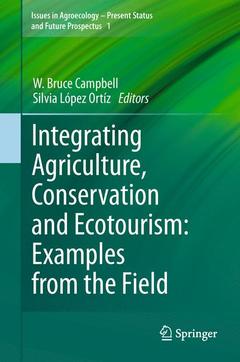Integrating Agriculture, Conservation and Ecotourism: Examples from the Field, 2011 Issues in Agroecology – Present Status and Future Prospectus Series, Vol. 1
Coordonnateurs : Campbell W. Bruce, López Ortíz Silvia

Foreword.- Acknowledgements.- List of Contributors and Biosketches of Editors and Authors.- 1. Agroecology – interpretations, approaches and their links to nature conservation, rural development and ecotourism.-A.Wezel, J.C. Jauneau.- 1.1. Introduction.- 1.2. Historical view of Agroecology.- 1.3. Current variations in definitions and scales in Agroecology.- 1.4. Interpretaion of agroecology as a science, a movement and a practice.- 1.5. Agroecology and nature conservation.- 1.6. Agroecology and territorial development.- 1.7. Agroecology and ecotourism.- 1.8. Conclusions.- 2. Organic compost and manufactured fertilizers: economics and ecology.-D.C.Weindorf, J.P. Muir, C. Landeros-Sánchez.- 2.1. Introduction.- 2.2. Soil organic matter.- 2.3. Global compost dynamics.- 2.4. Organic and inorganic fertilization: culture, economics, and sustainability.- 2.5. Limitations of composts as fertilizers.- 2.6. Manufactured fertilizers versus composts as fertilizers.- 2.7. Conclusions.- 3. Global perspectives on birds in agricultural landscapes.-R.J. Johnson, J.A. Jedlicka, J.E. Quinn, J.R. Brandle.- 3.1. Introduction.- 3.2. Agricultural change and birds.- 3.3. Europe.- 3.4. United States and Canada.- 3.5. Latin America – Mexico, the Caribbean, Central and South America.- 3.6. Global topics.- 3.7. The roles of ecotourism and agrotourism.- 3.8. Research needs and conservation applications.- 3.9. Conclusion.- 4. A review of ecosystem services, farmer livelihoods, and value chains in shade coffee agroecosystems.-S. Jha, C.M. Bacon, S.M. Philpott, R.A. Rice, V.E. Méndez, P. Läderach.- 4.1. Introduction.- 4.2. Ecology, history, and geography of shade coffee.- 4.3. Conventional and alternative coffee value chains.- 4.4. Ecological processes and ecosystem services.- 4.5. Interacting ecosystem services and the socio-economic costs and benefits of shade coffee, 4.6. Farmer livelihoods, vulnerability and change.- 4.7. Discussion: synthesis and policy directions.- 4.8. Conclusions.- 5. Ecosystem services from smallholder forestry and agroforestry in the tropics.-T. Idol, J. Haggar, L. Cox.- 5.1. Introduction.- 5.2. Smallholder forestry and agroforestry in the tropics.- 5.3. Ecosystem services from smallholder forestry and agroforestry.- 5.4. Comparison of ecosystem services from the two systems.- 5.5. Compensation for ecosystem services.- 5.6. Promoting adoption and adaptive management of sustainable smallholder systems.- 5.7. Summary and recommendations.- 6. Sustainable development of an agricultural region - the case of the Allgäu, southern Germany.-S. Weizenegger, A. Wezel.- 6.1. Introduction.- 6.2. The study area.- 6.3. Changes in land use patterns and structure of agriculture from the Middle Ages up to the present.- 6.4. Agriculture and forestry today – strengths and weaknesses 6.5. Tourism.- 6.6. Current regional and rural development programs and project examples in the Allgäu.- 6.7. Allgäu – a development towards sustainability?.- 6.8. Conclusions and perspectives for the future
Provides concise reviews of current important and complex issues in agroecology
Assesses the present status of knowledge of the issue with regard to effectively moving toward improving sustainability
Identifies inadequacies, errors, and gaps in knowledge that may hinder or oppose effective progress toward improving sustainability
Discusses what, if possible, is needed to bring the issue onto a better track toward sustainability objectives
Date de parution : 08-2013
Ouvrage de 304 p.
15.5x23.5 cm
Disponible chez l'éditeur (délai d'approvisionnement : 15 jours).
Prix indicatif 158,24 €
Ajouter au panierDate de parution : 06-2011
Ouvrage de 304 p.
15.5x23.5 cm
Disponible chez l'éditeur (délai d'approvisionnement : 15 jours).
Prix indicatif 158,24 €
Ajouter au panier


